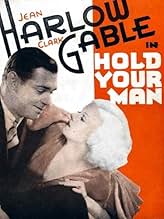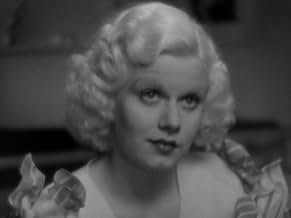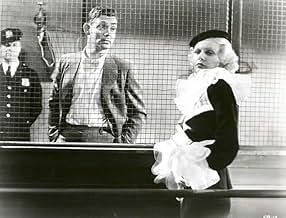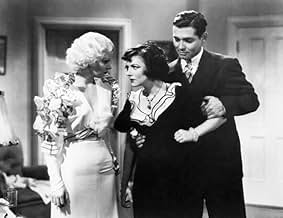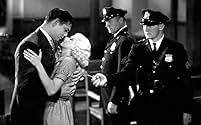VALUTAZIONE IMDb
6,9/10
1998
LA TUA VALUTAZIONE
Aggiungi una trama nella tua linguaA woman is sent to a reformatory when her con artist lover flees after killing a man during a botched blackmail scheme.A woman is sent to a reformatory when her con artist lover flees after killing a man during a botched blackmail scheme.A woman is sent to a reformatory when her con artist lover flees after killing a man during a botched blackmail scheme.
- Regia
- Sceneggiatura
- Star
- Premi
- 2 vittorie totali
Louise Beavers
- Elite Club Attendant
- (non citato nei titoli originali)
Wade Boteler
- Police Sergeant at Reformatory
- (non citato nei titoli originali)
Bobby Caldwell
- Ruby & Eddie's Son
- (non citato nei titoli originali)
Nora Cecil
- Miss Campbell
- (non citato nei titoli originali)
Jack Cheatham
- Policeman
- (non citato nei titoli originali)
G. Pat Collins
- Phil Dunn
- (non citato nei titoli originali)
Nell Craig
- Miss Willard - Reformatory Matron
- (non citato nei titoli originali)
Recensioni in evidenza
Hold Your Man (1933)
*** (out of 4)
MGM tearjerker has a couple con artists (Jean Harlow, Clark Gable) falling in love but after an accidental murder they're separated. Gable takes off and Harlow ends up in a reform school where she learns she's pregnant but fears that she'll never see her man again. I really wasn't sure where this thing was going as it blends a strange mix of comedy with drama but in the end I found it quite touching. The first half plays as a comedy and gets a lot of laughs including a hilarious scene where Gable tries hiding from the police by getting in a tub and putting soap all over himself. There are plenty of pre-code moments mixed in with most of them coming from Harlow showing off various limbs. Gable is as good as always but it's Harlow who really steals the show. This is the first time I've seen her take on a dramatic role and she nails it perfectly. She's given several emotional scenes and she comes off very well. The ending is very dramatic and contains a beautiful message that comes across very well. It's also worth noting that there's a black preacher in the film and I think this is the nicest role I've seen a black actor play in this era of Hollywood. The stereotypes we normally see in this type of film are thrown out the window and this must have been one of the earliest films to show a black man in such a nice form.
*** (out of 4)
MGM tearjerker has a couple con artists (Jean Harlow, Clark Gable) falling in love but after an accidental murder they're separated. Gable takes off and Harlow ends up in a reform school where she learns she's pregnant but fears that she'll never see her man again. I really wasn't sure where this thing was going as it blends a strange mix of comedy with drama but in the end I found it quite touching. The first half plays as a comedy and gets a lot of laughs including a hilarious scene where Gable tries hiding from the police by getting in a tub and putting soap all over himself. There are plenty of pre-code moments mixed in with most of them coming from Harlow showing off various limbs. Gable is as good as always but it's Harlow who really steals the show. This is the first time I've seen her take on a dramatic role and she nails it perfectly. She's given several emotional scenes and she comes off very well. The ending is very dramatic and contains a beautiful message that comes across very well. It's also worth noting that there's a black preacher in the film and I think this is the nicest role I've seen a black actor play in this era of Hollywood. The stereotypes we normally see in this type of film are thrown out the window and this must have been one of the earliest films to show a black man in such a nice form.
"Hold Your Man" is significant as Harlow's transitional film from the pre-code days. Although technically the Hays Code did not go into effect until July 1934, studios were to some extent trying to police themselves earlier than that to take some of the heat off. Harlow is significantly de-tuned physically here, from the hot presence a year earlier in "Red-Headed Woman" and "Red Dust". It also appears that to illustrate their ability to police themselves without a formal approval process, the studio tacked on a moralistic second half that turned a very entertaining romantic comedy into a sappy melodrama.
The film begins when depression-era hustler Eddie (Clark Gable) and his pal Slim con a pedestrian out of $30. Running from the police he blunders into an apartment and finds Ruby (Harlow) taking a bath. Ruby turns out to be a bit of a con artist herself and gets rid of the police. Eddie takes off but he has made an impression on Ruby and she arranges an "accidental" meeting. They soon fall in love but their marriage plans are interrupted by Eddie's accidental murder of one of Ruby's marks. He gets away but Ruby gets two years in a reformatory, which is portrayed as an intense Home Economics class.
Until it crashes and burns at the end this is a slick little romantic comedy written by Anita Loos (Gentlemen Prefer Blondes). Gable provides his standard bravado and Harlow gives it right back to him. The script is quite clever and entertaining. Gable does not have quite the chemistry with Harlow that he had with Claudette Colbert or Rosalind Russell, but this is the kind of film that is best when its two stars are competing instead of cuddling.
Unfortunately the audience's identification impulse and emotional connection are casualties of Harlow's abrupt personality change from gritty seductress to dewy-eyed self-pitying victim. This confuses and distances those who were most involved in the story until that point.
Then again, what do I know? I'm only a child.
The film begins when depression-era hustler Eddie (Clark Gable) and his pal Slim con a pedestrian out of $30. Running from the police he blunders into an apartment and finds Ruby (Harlow) taking a bath. Ruby turns out to be a bit of a con artist herself and gets rid of the police. Eddie takes off but he has made an impression on Ruby and she arranges an "accidental" meeting. They soon fall in love but their marriage plans are interrupted by Eddie's accidental murder of one of Ruby's marks. He gets away but Ruby gets two years in a reformatory, which is portrayed as an intense Home Economics class.
Until it crashes and burns at the end this is a slick little romantic comedy written by Anita Loos (Gentlemen Prefer Blondes). Gable provides his standard bravado and Harlow gives it right back to him. The script is quite clever and entertaining. Gable does not have quite the chemistry with Harlow that he had with Claudette Colbert or Rosalind Russell, but this is the kind of film that is best when its two stars are competing instead of cuddling.
Unfortunately the audience's identification impulse and emotional connection are casualties of Harlow's abrupt personality change from gritty seductress to dewy-eyed self-pitying victim. This confuses and distances those who were most involved in the story until that point.
Then again, what do I know? I'm only a child.
Jean Harlow plays a streetwise dame who falls for charming con man Clark Gable. After Gable accidentally kills a guy, he takes off and leaves Harlow to take the rap. She winds up in a women's reformatory where she discovers she's pregnant. Mix of romantic comedy and drama helped a lot by the immense likability and sublime chemistry of its two leads. Harlow is terrific. One great scene has a floozy slapping Jean, only to get a punch in the kisser in return. The floozy tries it again later and gets the same results! Gable is as roguish as ever. It's hard to dislike him, even when he plays a cad. Love the girls at the reformatory. They're fun characters with some great lines. The sweet ending will please everybody but cynical types. Harlow fans should love this one.
Jean Harlow and Clark Gable star in "Hold Your Man," a film from 1933.
Gable plays con man Eddie Hall who runs into the apartment of Ruby Adams (Harlow) as he races to escape from the police. She's taking a bath and isn't happy having a strange man in her apartment. But Ruby has no problem taking care of herself.
Though she is dating a sturdy businessman (Stu Erwin) whom she attempts to con for her rent money, Ruby falls for Eddie. She falls for him so hard that she helps him with a con and winds up in prison. One day she gets dizzy. Well, we know what that means. But Eddie hasn't been in touch. Then, one day, she gets word of him from an unlikely person.
The highlight of this film is the snappy dialogue and the wonderful Harlow who, when she's offered a look at Gable's bedroom says, "Send me a picture of it." There was criticism here that when she went into prison, her personality changed, but I disagree. It's obvious in the beginning that she's interested in Eddie, and why wouldn't a woman in love, in prison, and pregnant, show vulnerability? That was the great thing about Harlow - underneath the street-smart wise cracks, there was a sensitivity.
Gable had been ascending the Hollywood ladder by leaps and bounds, and he is delightful here. Both he and Harlow play characters who put up a front, but ultimately their defenses come down.
I enjoyed it.
Gable plays con man Eddie Hall who runs into the apartment of Ruby Adams (Harlow) as he races to escape from the police. She's taking a bath and isn't happy having a strange man in her apartment. But Ruby has no problem taking care of herself.
Though she is dating a sturdy businessman (Stu Erwin) whom she attempts to con for her rent money, Ruby falls for Eddie. She falls for him so hard that she helps him with a con and winds up in prison. One day she gets dizzy. Well, we know what that means. But Eddie hasn't been in touch. Then, one day, she gets word of him from an unlikely person.
The highlight of this film is the snappy dialogue and the wonderful Harlow who, when she's offered a look at Gable's bedroom says, "Send me a picture of it." There was criticism here that when she went into prison, her personality changed, but I disagree. It's obvious in the beginning that she's interested in Eddie, and why wouldn't a woman in love, in prison, and pregnant, show vulnerability? That was the great thing about Harlow - underneath the street-smart wise cracks, there was a sensitivity.
Gable had been ascending the Hollywood ladder by leaps and bounds, and he is delightful here. Both he and Harlow play characters who put up a front, but ultimately their defenses come down.
I enjoyed it.
I always loved Rita Hayworth and Ava Gardner, but not so much Jean Harlow. Me = dumb. I'd only seen clips of her films here and there. I always thought she was a hot one-liner, a glamour girl. But after seeing this, my first full length Jean Harlow experience, I admit that Miss Harlow was a truly great screen artist with the gift of creating rich characters. I simply fell in love with her, not because she was the first blonde bombshell or because she died young and became a legend. In this film, Miss Harlow's character is multi-dimensional beyond the traditional 1930's moll. She starts out one place and travels an arduous journey to end up on the other side of life. I loved her tough exterior. I loved her smile. I loved her song at the piano. My God, she was stupendous, she made me burst into tears when she sang her sad song. Most of all, I loved the HAPPY ENDING, Hollywood style. One other thing I was thrilled about was the African American inmate and her preacher father. Anita Loos was SO ahead of her time. She wrote 2 characters who were so lovely and so real. The inmate girl and her father brought such harmony to their scenes with all the white folk. A REVELATION for me. I hate stereotypes.
Lo sapevi?
- QuizWhen Eddie is looking around Ruby's apartment, waiting for his clothes to dry, he spots a pennant on the wall that says "Albany Night Boat." That refers to the steamships that would depart New York City in the early evening for an overnight trip up the Hudson River to Albany. The ships had hundreds of staterooms and often were used---as the film's contemporary audience would know---for romantic getaways or illicit affairs. The pillow Eddie sees next also may have been a souvenir from the ship, as it's inscribed, "We're here to-day/To-morrow we're through/So let's be gay/It is up to you." Such trips peaked in the early 20th century, but started to decline in the 1930s when less costly, speedier, and more efficient modes of transportation by rail and automobile came to the fore. By the 1940s, the Albany Night Boat had virtually ceased to exist.
- BlooperWhen Eddie slams the door after tossing Aubrey Mitchell out of the apartment, the wall shakes.
- ConnessioniFeatured in Argento vivo (1933)
- Colonne sonoreHold Your Man
(1933) (uncredited)
Music by Nacio Herb Brown
Lyrics by Arthur Freed
Played on a record and sung by Harriet Lee
Reprised by Jean Harlow, playing piano and singing
I più visti
Accedi per valutare e creare un elenco di titoli salvati per ottenere consigli personalizzati
- How long is Hold Your Man?Powered by Alexa
Dettagli
Botteghino
- Budget
- 266.000 USD (previsto)
- Tempo di esecuzione
- 1h 27min(87 min)
- Colore
- Proporzioni
- 1.37 : 1
Contribuisci a questa pagina
Suggerisci una modifica o aggiungi i contenuti mancanti


